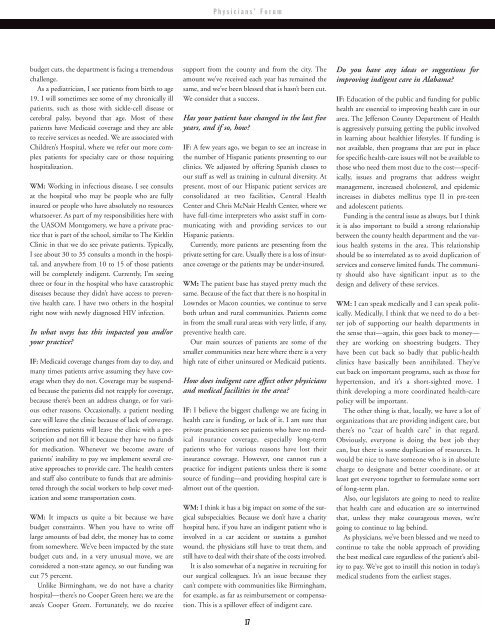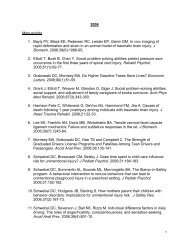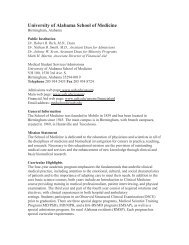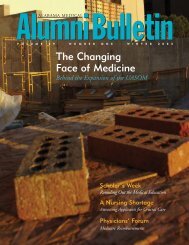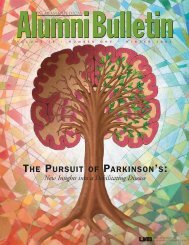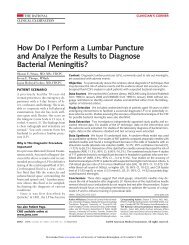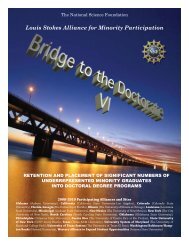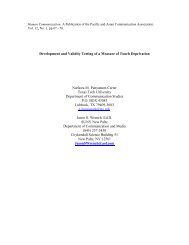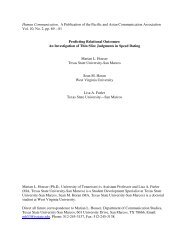uasom doctors uasom doctors - University of Alabama at Birmingham
uasom doctors uasom doctors - University of Alabama at Birmingham
uasom doctors uasom doctors - University of Alabama at Birmingham
Create successful ePaper yourself
Turn your PDF publications into a flip-book with our unique Google optimized e-Paper software.
Physicians’ Forum<br />
budget cuts, the department is facing a tremendous<br />
challenge.<br />
As a pedi<strong>at</strong>rician, I see p<strong>at</strong>ients from birth to age<br />
19. I will sometimes see some <strong>of</strong> my chronically ill<br />
p<strong>at</strong>ients, such as those with sickle-cell disease or<br />
cerebral palsy, beyond th<strong>at</strong> age. Most <strong>of</strong> these<br />
p<strong>at</strong>ients have Medicaid coverage and they are able<br />
to receive services as needed. We are associ<strong>at</strong>ed with<br />
Children’s Hospital, where we refer our more complex<br />
p<strong>at</strong>ients for specialty care or those requiring<br />
hospitaliz<strong>at</strong>ion.<br />
WM: Working in infectious disease, I see consults<br />
<strong>at</strong> the hospital who may be people who are fully<br />
insured or people who have absolutely no resources<br />
wh<strong>at</strong>soever. As part <strong>of</strong> my responsibilities here with<br />
the UASOM Montgomery, we have a priv<strong>at</strong>e practice<br />
th<strong>at</strong> is part <strong>of</strong> the school, similar to The Kirklin<br />
Clinic in th<strong>at</strong> we do see priv<strong>at</strong>e p<strong>at</strong>ients. Typically,<br />
I see about 30 to 35 consults a month in the hospital,<br />
and anywhere from 10 to 15 <strong>of</strong> those p<strong>at</strong>ients<br />
will be completely indigent. Currently, I’m seeing<br />
three or four in the hospital who have c<strong>at</strong>astrophic<br />
diseases because they didn’t have access to preventive<br />
health care. I have two others in the hospital<br />
right now with newly diagnosed HIV infection.<br />
In wh<strong>at</strong> ways has this impacted you and/or<br />
your practice?<br />
IF: Medicaid coverage changes from day to day, and<br />
many times p<strong>at</strong>ients arrive assuming they have coverage<br />
when they do not. Coverage may be suspended<br />
because the p<strong>at</strong>ients did not reapply for coverage,<br />
because there’s been an address change, or for various<br />
other reasons. Occasionally, a p<strong>at</strong>ient needing<br />
care will leave the clinic because <strong>of</strong> lack <strong>of</strong> coverage.<br />
Sometimes p<strong>at</strong>ients will leave the clinic with a prescription<br />
and not fill it because they have no funds<br />
for medic<strong>at</strong>ion. Whenever we become aware <strong>of</strong><br />
p<strong>at</strong>ients’ inability to pay we implement several cre<strong>at</strong>ive<br />
approaches to provide care. The health centers<br />
and staff also contribute to funds th<strong>at</strong> are administered<br />
through the social workers to help cover medic<strong>at</strong>ion<br />
and some transport<strong>at</strong>ion costs.<br />
WM: It impacts us quite a bit because we have<br />
budget constraints. When you have to write <strong>of</strong>f<br />
large amounts <strong>of</strong> bad debt, the money has to come<br />
from somewhere. We’ve been impacted by the st<strong>at</strong>e<br />
budget cuts and, in a very unusual move, we are<br />
considered a non-st<strong>at</strong>e agency, so our funding was<br />
cut 75 percent.<br />
Unlike <strong>Birmingham</strong>, we do not have a charity<br />
hospital—there’s no Cooper Green here; we are the<br />
area’s Cooper Green. Fortun<strong>at</strong>ely, we do receive<br />
support from the county and from the city. The<br />
amount we’ve received each year has remained the<br />
same, and we’ve been blessed th<strong>at</strong> is hasn’t been cut.<br />
We consider th<strong>at</strong> a success.<br />
Has your p<strong>at</strong>ient base changed in the last five<br />
years, and if so, how?<br />
IF: A few years ago, we began to see an increase in<br />
the number <strong>of</strong> Hispanic p<strong>at</strong>ients presenting to our<br />
clinics. We adjusted by <strong>of</strong>fering Spanish classes to<br />
our staff as well as training in cultural diversity. At<br />
present, most <strong>of</strong> our Hispanic p<strong>at</strong>ient services are<br />
consolid<strong>at</strong>ed <strong>at</strong> two facilities, Central Health<br />
Center and Chris McNair Health Center, where we<br />
have full-time interpreters who assist staff in communic<strong>at</strong>ing<br />
with and providing services to our<br />
Hispanic p<strong>at</strong>ients.<br />
Currently, more p<strong>at</strong>ients are presenting from the<br />
priv<strong>at</strong>e setting for care. Usually there is a loss <strong>of</strong> insurance<br />
coverage or the p<strong>at</strong>ients may be under-insured.<br />
WM: The p<strong>at</strong>ient base has stayed pretty much the<br />
same. Because <strong>of</strong> the fact th<strong>at</strong> there is no hospital in<br />
Lowndes or Macon counties, we continue to serve<br />
both urban and rural communities. P<strong>at</strong>ients come<br />
in from the small rural areas with very little, if any,<br />
preventive health care.<br />
Our main sources <strong>of</strong> p<strong>at</strong>ients are some <strong>of</strong> the<br />
smaller communities near here where there is a very<br />
high r<strong>at</strong>e <strong>of</strong> either uninsured or Medicaid p<strong>at</strong>ients.<br />
How does indigent care affect other physicians<br />
and medical facilities in the area?<br />
IF: I believe the biggest challenge we are facing in<br />
health care is funding, or lack <strong>of</strong> it. I am sure th<strong>at</strong><br />
priv<strong>at</strong>e practitioners see p<strong>at</strong>ients who have no medical<br />
insurance coverage, especially long-term<br />
p<strong>at</strong>ients who for various reasons have lost their<br />
insurance coverage. However, one cannot run a<br />
practice for indigent p<strong>at</strong>ients unless there is some<br />
source <strong>of</strong> funding—and providing hospital care is<br />
almost out <strong>of</strong> the question.<br />
WM: I think it has a big impact on some <strong>of</strong> the surgical<br />
subspecialties. Because we don’t have a charity<br />
hospital here, if you have an indigent p<strong>at</strong>ient who is<br />
involved in a car accident or sustains a gunshot<br />
wound, the physicians still have to tre<strong>at</strong> them, and<br />
still have to deal with their share <strong>of</strong> the costs involved.<br />
It is also somewh<strong>at</strong> <strong>of</strong> a neg<strong>at</strong>ive in recruiting for<br />
our surgical colleagues. It’s an issue because they<br />
can’t compete with communities like <strong>Birmingham</strong>,<br />
for example, as far as reimbursement or compens<strong>at</strong>ion.<br />
This is a spillover effect <strong>of</strong> indigent care.<br />
17<br />
Do you have any ideas or suggestions for<br />
improving indigent care in <strong>Alabama</strong>?<br />
IF: Educ<strong>at</strong>ion <strong>of</strong> the public and funding for public<br />
health are essential to improving health care in our<br />
area. The Jefferson County Department <strong>of</strong> Health<br />
is aggressively pursuing getting the public involved<br />
in learning about healthier lifestyles. If funding is<br />
not available, then programs th<strong>at</strong> are put in place<br />
for specific health-care issues will not be available to<br />
those who need them most due to the cost—specifically,<br />
issues and programs th<strong>at</strong> address weight<br />
management, increased cholesterol, and epidemic<br />
increases in diabetes mellitus type II in pre-teen<br />
and adolescent p<strong>at</strong>ients.<br />
Funding is the central issue as always, but I think<br />
it is also important to build a strong rel<strong>at</strong>ionship<br />
between the county health department and the various<br />
health systems in the area. This rel<strong>at</strong>ionship<br />
should be so interrel<strong>at</strong>ed as to avoid duplic<strong>at</strong>ion <strong>of</strong><br />
services and conserve limited funds. The community<br />
should also have significant input as to the<br />
design and delivery <strong>of</strong> these services.<br />
WM: I can speak medically and I can speak politically.<br />
Medically, I think th<strong>at</strong> we need to do a better<br />
job <strong>of</strong> supporting our health departments in<br />
the sense th<strong>at</strong>—again, this goes back to money—<br />
they are working on shoestring budgets. They<br />
have been cut back so badly th<strong>at</strong> public-health<br />
clinics have basically been annihil<strong>at</strong>ed. They’ve<br />
cut back on important programs, such as those for<br />
hypertension, and it’s a short-sighted move. I<br />
think developing a more coordin<strong>at</strong>ed health-care<br />
policy will be important.<br />
The other thing is th<strong>at</strong>, locally, we have a lot <strong>of</strong><br />
organiz<strong>at</strong>ions th<strong>at</strong> are providing indigent care, but<br />
there’s no “czar <strong>of</strong> health care” in th<strong>at</strong> regard.<br />
Obviously, everyone is doing the best job they<br />
can, but there is some duplic<strong>at</strong>ion <strong>of</strong> resources. It<br />
would be nice to have someone who is in absolute<br />
charge to design<strong>at</strong>e and better coordin<strong>at</strong>e, or <strong>at</strong><br />
least get everyone together to formul<strong>at</strong>e some sort<br />
<strong>of</strong> long-term plan.<br />
Also, our legisl<strong>at</strong>ors are going to need to realize<br />
th<strong>at</strong> health care and educ<strong>at</strong>ion are so intertwined<br />
th<strong>at</strong>, unless they make courageous moves, we’re<br />
going to continue to lag behind.<br />
As physicians, we’ve been blessed and we need to<br />
continue to take the noble approach <strong>of</strong> providing<br />
the best medical care regardless <strong>of</strong> the p<strong>at</strong>ient’s ability<br />
to pay. We’ve got to instill this notion in today’s<br />
medical students from the earliest stages.


